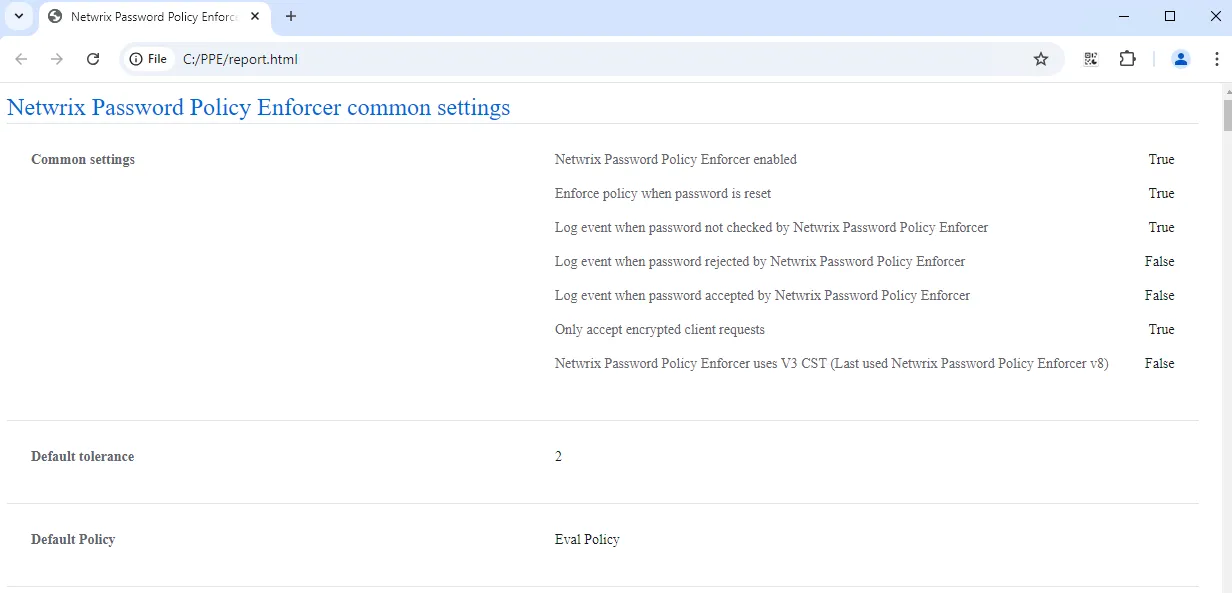Get-PPEConfigReport
The Get-PPEConfigReport cmdlet saves a Password Policy Enforcer configuration report.
NOTE: This cmdlet calls the PPE Tool. You must be an administrator to run this cmdlet. Start PowerShell with the Run as Administrator option.
SYNTAX
Get-PPEConfigReport -Folder <_string_>
PARAMETERS
-Folder <_string_>
Name of the folder to save the report.
<_CommonParameters_>
This cmdlet supports the common parameters: Verbose, Debug, ErrorAction, ErrorVariable, WarningAction, WarningVariable, OutBuffer, PipelineVariable, and OutVariable. For more information, see about_CommonParameters https:/go.microsoft.com/fwlink/?LinkID=113216.
EXAMPLE
PS C:> Get-PPEConfigReport -Folder C:\PPE
The report is created: "C:\PPE\report.html".

Get-PPEEnabled
The Get-PPEEnabled cmdlet returns the enabled/disabled status of the PPE Server.
SYNTAX
Get-PPEEnabled [<_CommonParameters_>]
PARAMETERS
<_CommonParameters_>
This cmdlet supports the common parameters: Verbose, Debug, ErrorAction, ErrorVariable, WarningAction, WarningVariable, OutBuffer, PipelineVariable, and OutVariable. For more information, see about_CommonParameters https:/go.microsoft.com/fwlink/?LinkID=113216.
EXAMPLE
PS C:> Get-PPEEnabled
Status PPE : Enabled
Get-PPEHelp
The Get-PPEHelp cmdlet lists the available Password Policy Enforcer cmdlets. If a cmdlet is specified, returns help for the cmdlet.
SYNTAX
Get-PPEHelp [[-Cmdlet] <_string_>]
PARAMETERS
-Cmdlet <_string_>
Name of the cmdlet for help. Can also use -C or -c.
<CommonParameters>
This cmdlet supports the common parameters: Verbose, Debug, ErrorAction, ErrorVariable, WarningAction, WarningVariable, OutBuffer, PipelineVariable, and OutVariable. For more information, see about_CommonParameters https:/go.microsoft.com/fwlink/?LinkID=113216.
EXAMPLE
PS C:> get-ppehelp get-ppehelp
NAME
Get-PPEHelp
SYNOPSIS
Get a list of the PPE Cmdlet
SYNTAX
Get-PPEHelp [[-Cmdlet] <string>] [<CommonParameters>]
DESCRIPTION
Get a list of the PPE Cmdlet
RELATED LINKS
https://www.netwrix.com/password_policy_enforcer.html
REMARKS
To see the examples, type: "get-help Get-PPEHelp -examples".
For more information, type: "get-help Get-PPEHelp -detailed".
For technical information, type: "get-help Get-PPEHelp -full".
For online help, type: "get-help Get-PPEHelp -online"
Get-PPELicenseInfo
The Get-PPELicenseInfo cmdlet returns the Password Policy Enforcer license information.
SYNTAX
Get-PPELicenseInfo [<_CommonParameters_>]
PARAMETERS
<_CommonParameters_>
This cmdlet supports the common parameters: Verbose, Debug, ErrorAction, ErrorVariable, WarningAction, WarningVariable, OutBuffer, PipelineVariable, and OutVariable. For more information, see about_CommonParameters https:/go.microsoft.com/fwlink/?LinkID=113216.
EXAMPLE
PS C:\> Get-PPELicenseInfo
ANIXIS Software License Certificate
Product: Password Policy Enforcer
License type: Perpetual
Licensed to: test
Version: 11
Users: 100
<ANIXIS_LICENSE>JrPQdyhsxWrLj7RsuX322Ni8vwIRr6ozC+sY3M16aJba
XuRXG6VjOjWUMT1XwqO4c3VA0eIB8+z4KyUNEzLjmSZKvtLsHb0kFYi1zRiL
6EBVflEmzxYIsCvAlsg1fNfK1JgjFefOc1gENy2CBikDTbe+HnHf3aVBq6p2
Va1eXmMXToi3NDNJCNFzQHy7ZGC5AhQ8GIjQfgK8z9s1sHzpdj2Gn+9BEyQQ
nv833QdoFhjKoAXN/xCecZclkCkP9f1GLuq4kN0Emsh5qqXl686JBJlisA3o
XWQrEQ0Me9P3TkSUpb742JCngQaGcjKHvQoufBJ+GIrcwWG2DZJ1i9xrOJMT
g8D5eFDz/OiqXuZyBHFTInbq77V59x/xtIlUffBW7sCUmY8B+ZhLR2XpLdxr
S+4E37Lhf46bScltZxfHZbDQKZuT4hdMKnnzgNHEzkMh8Q3T/40sMvQbAV4O
tDF633YsQMH3Ttbyc+vAvIvbAHJOVhBpNd9TCybfas+j6uQL5fa4qo8dFrx+
+UrPakOmSL/eDR7xB5/zmB37shDXIPfzfG/Vu7I1/EQuH01rZDyafHnzTmmm
1hCMqyi+oVzxZtN8I3sIpAH3FLu+1N37CuHJFrXD97Iu6RjKi+11nG9BmZ2Q
0SX5EYc=</ANIXIS_LICENSE>
Get-PPEServerVersion
The Get-PPEServerVersion cmdlet returns the Password Policy Enforcer server version.
SYNTAX
Get-PPEServerVersion [-DC] <_string_>] [<_CommonParameters_>]
PARAMETERS
-DC <_string_>
Name of the domain controller running the PPE Server. If not specified, the current domain controller is used.
-Local <_SwitchParameter_>
Connect to PPE Server installed locally. Can also use -L or -l.
<_CommonParameters_>
This cmdlet supports the common parameters: Verbose, Debug, ErrorAction, ErrorVariable, WarningAction, WarningVariable, OutBuffer, PipelineVariable, and OutVariable. For more information, see about_CommonParameters https:/go.microsoft.com/fwlink/?LinkID=113216.
EXAMPLE
PS C:> Get-PPEServerVersion -DC NT-DC03.NWXTECH.COM
Version: 11.0.0.74
Get-PPEVersion
The Get-PPEVersion cmdlet returns the version of the Password Policy Enforcer PowerShell module.
SYNTAX
Get-PPEVersion [<_CommonParameters_>]
PARAMETERS
<_CommonParameters_>
This cmdlet supports the common parameters: Verbose, Debug, ErrorAction, ErrorVariable, WarningAction, WarningVariable, OutBuffer, PipelineVariable, and OutVariable. For more information, see about_CommonParameters https:/go.microsoft.com/fwlink/?LinkID=113216.
EXAMPLE
PS C:> Get-PPEVersion
Version: 11.0.0.74
Set-PPEEnabled
The Set-PPEEnabled cmdlet sets the enabled/disabled status for the PPE Server.
SYNTAX
Set-PPEEnabled -Enable] <_int_> [<_CommonParameters_>]
PARAMETERS
-Enable <_int_>
Specify 1 to enable the PPE Server, specify 0 to disable the PPE Server. Can also use -E or -e.
<_CommonParameters_>
This cmdlet supports the common parameters: Verbose, Debug, ErrorAction, ErrorVariable, WarningAction, WarningVariable, OutBuffer, PipelineVariable, and OutVariable. For more information, see about_CommonParameters https:/go.microsoft.com/fwlink/?LinkID=113216.
EXAMPLES
PS C:> Set-PPEEnabled -Enable 0
Status PPE : Disabled
PS C:> Set-PPEEnabled -Enable 1
Status PPE : Enabled